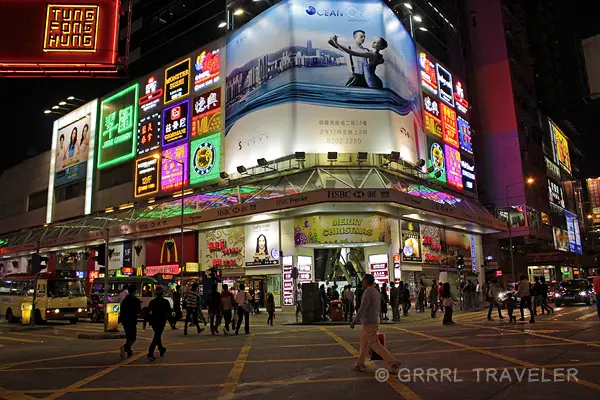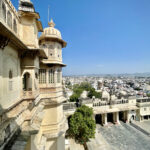Last Updated on August 11, 2017 by Christine Kaaloa
When I booked my flight to Hong Kong, I knew little of what to expect. At the time, I didn’t have any reasons to visit Hong Kong, other than it was a destination I’d never traveled and I needed to take a trip somewhere.
I only knew three things … it was a modern city, it would likely have Chinese cuisine and most importantly to me for winging a trip, it didn’t require a visa for entrance.
I never suspected it would be one of those countries that floored me. From my very first ride into the city to my departure, Hong Kong’s unique urban attributes took my surprise to a magnitude I’ve never before experienced.
.
Table of Contents: 7 Jaw-dropping Reasons to visit Hong Kong now
7 jaw-dropping reasons to visit Hong Kong:
1. Skyscrapers
Hong Kong is known as the “skyscraper city”. Due to the dense population, Hong Kong’s solution to housing is to build upward. Thus, while most cities build skyscrapers for commercial purposes, Hong Kong builds them for residential use, as well. As such, Hong Kong is ranked #1 in the world as the city with the most skyscrapers.
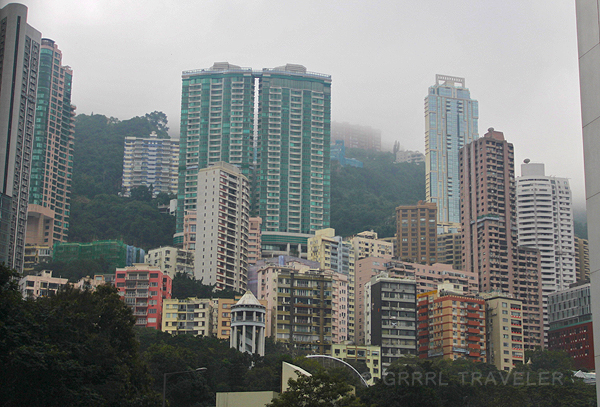

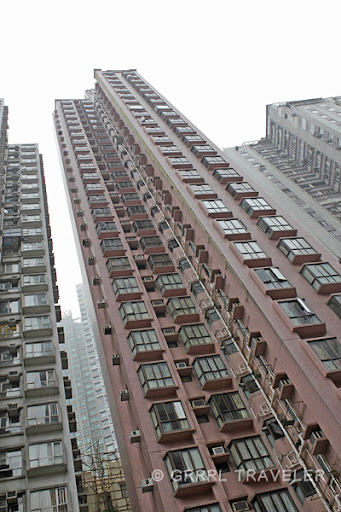
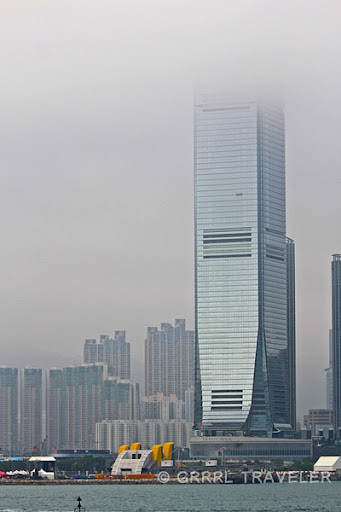
2. The Skyline
Move over New York and Chicago. Hong Kong has a skyline that beats everyone out, especially at night. Looking out at Hong Kong Island from Kowloon, the neon glow of the cityscape can go on forever.
How long is the skyline? Take a look at the Youtube video below and see.

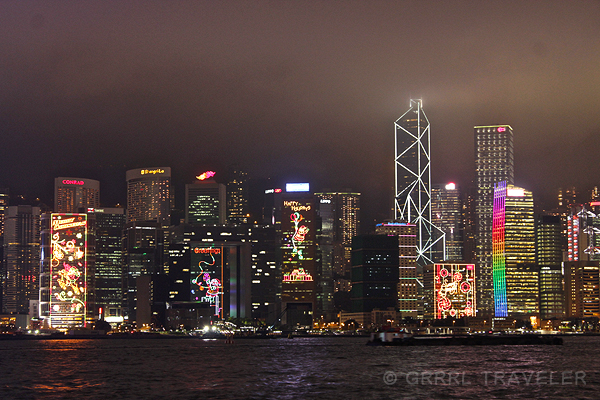
3. Double-deck buses
Formerly a British colony, the double deck bus was introduced to Hong Kong in 1949 and since, it’s stayed as the common form of bus transportation of the city. There are also double deck trams, as well. Grab your octopus transportation card and give it a try.
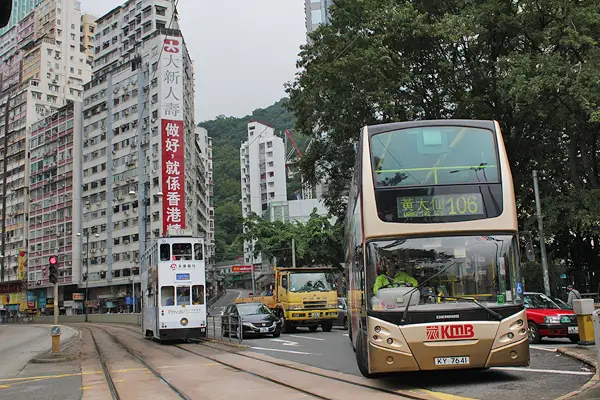
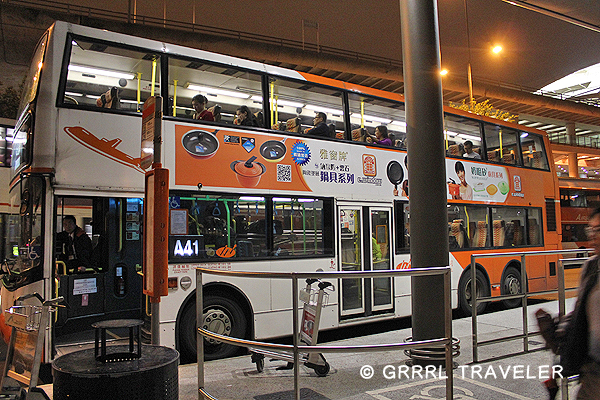 .
.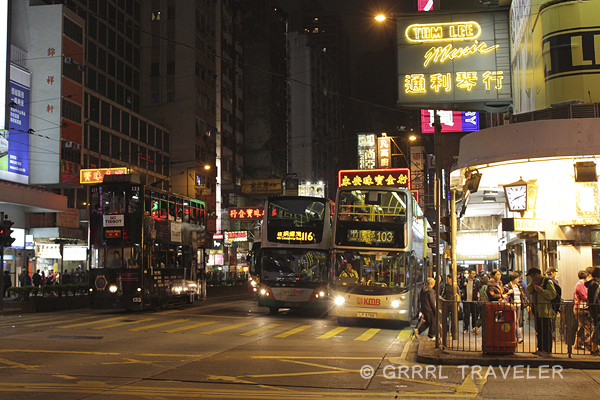
4. Raised walkways and a raised eyeline
In most cities, the average sight line is eye level. Anything above it, is generally, disregarded as viable commercial space. Hong Kong is a different story. Hong Kong Island occasionally has raised walkways to connect you between buildings and to lift foot traffic over the streets. One should never underestimate stores and restaurants placed on the second or third floors.
Below photo: Soho Stairway is an 800 m escalator walk way up the side of a hill. It’s a 20 minute walkway, but otherwise, on foot it takes 45 minutes. It gives you a chance to see a few cool second-level shops and cafes, you otherwise might not have noticed. Tip: The Soho escalators aren’t actually built for sightseeing, but more practically for getting around; thus, it’s not easy to take photos when you’re on it.
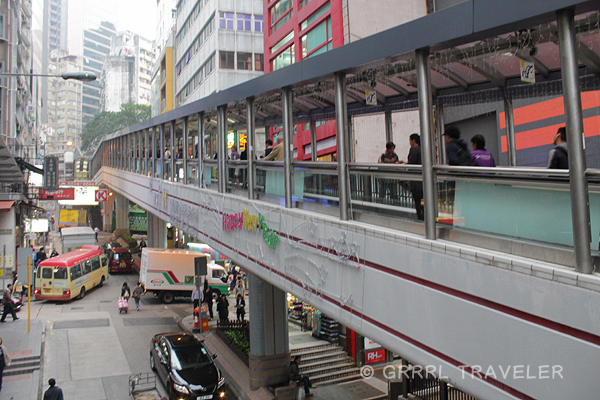
5. The Crowds
How many people do the streets of Hong Kong hold? An unimaginable lot. As a thriving international city, the population averages 6,300 people per square kilometer.


6. Signs are everywhere
The streets of Hong Kong are checkered with neon lit signage. It’s hard not to notice the lack of head space in its surroundings. Every place you look there’s signs from business names, road instructions to rules in the park.
Of the signage, one resident said, “Hong Kong society adheres to a lot of rules. Folks here, don’t question them; they simply follow them.”
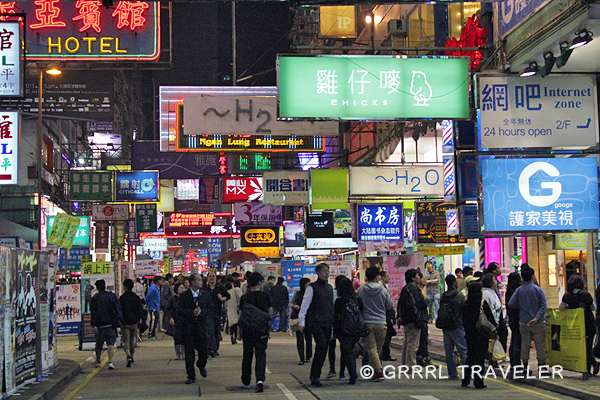
 .
. <
< .
.7. Communal Dining
When the restaurant packed full, what can you do but pull out the chair of the nearest available seat. Don’t worry, Hong Kongese don’t mind, communal dining is common. Join a family or a group of strangers and strike up a conversation. In fact, you can even ask locals their advice on food.
Below, an onlooker watches as the waiter takes a traveler’s order. The diner advised her against her interest in his own dish… beef tongue.

Where to stay in Hong Kong?
Speaking of accommodations, Hong Kong can be fairly pricy. It’s probably the only cost that could burn into your budget. I stayed at a hostel in downtown Hong Kong. Across the river is Kowloon is a little older and houses more traditional sights and buildings. While I didn’t stay in Kowloon, a cheap budget dive that travelers often like to try are Chungking Mansion.
Yesinn @Causeway Bay Causeway Bay, Hong Kong ( map)
It was convenient and not far from the subway or bus stop. People there are friendly and helpful and the hostel is modern, dorms/beds are clean and well-maintained. You get a curtain for privacy.
– Take AirBus No.A11 from airport is recommended. You can take the metro to Causeway Bay MRT Station also. The AirBus is the cheaper option.
Getting around Hong Kong
Transportation in Hong Kong is efficient and timely. Options for getting around are: metro, tram, bus and ferry. It’s easy to get around via metro and bus.
Travel tip: Buy an octopus card.
Buy an octopus card at the metro station information booth on the second floor of the airport. It can be used on subway, buses, ferries, and trams.You’ll pay $100HKD as a deposit, which will be returned upon return. You can add as much money as you want on it. You can also pick these up at any metro station information booth.
What are your reasons to visit Hong Kong?
Related Hong Kong Posts
Travel Guide: Best Things to Do in Hong Kong
Visiting Big Buddha at Lantau Island
Check out my Hong Kong & Macau itinerary guide.
Tao O Island and dolphins


